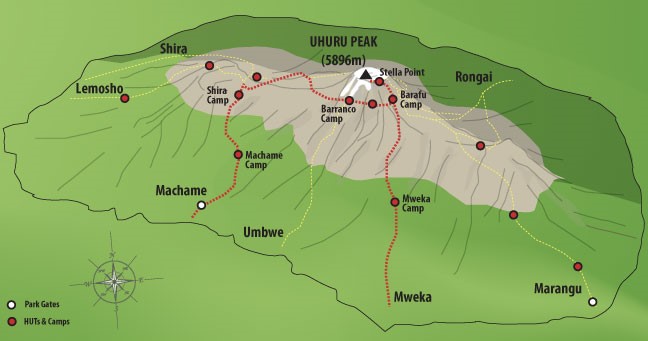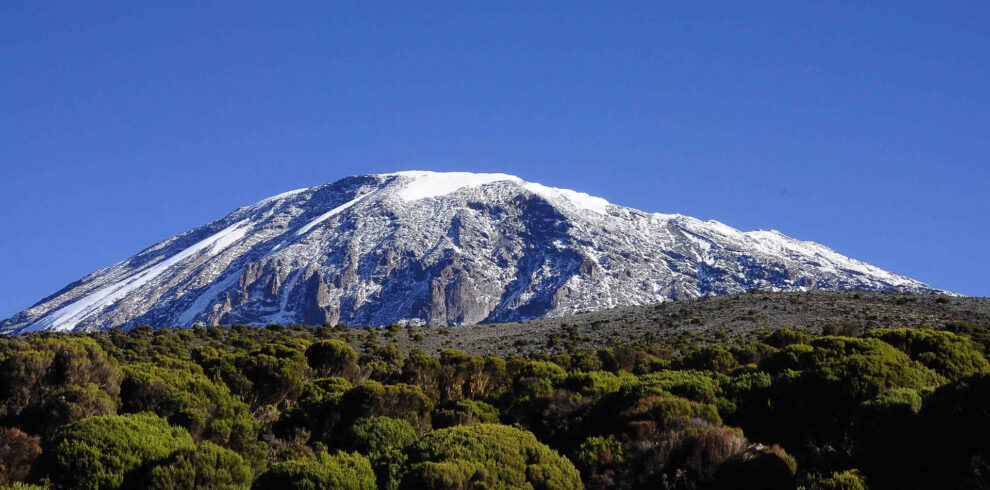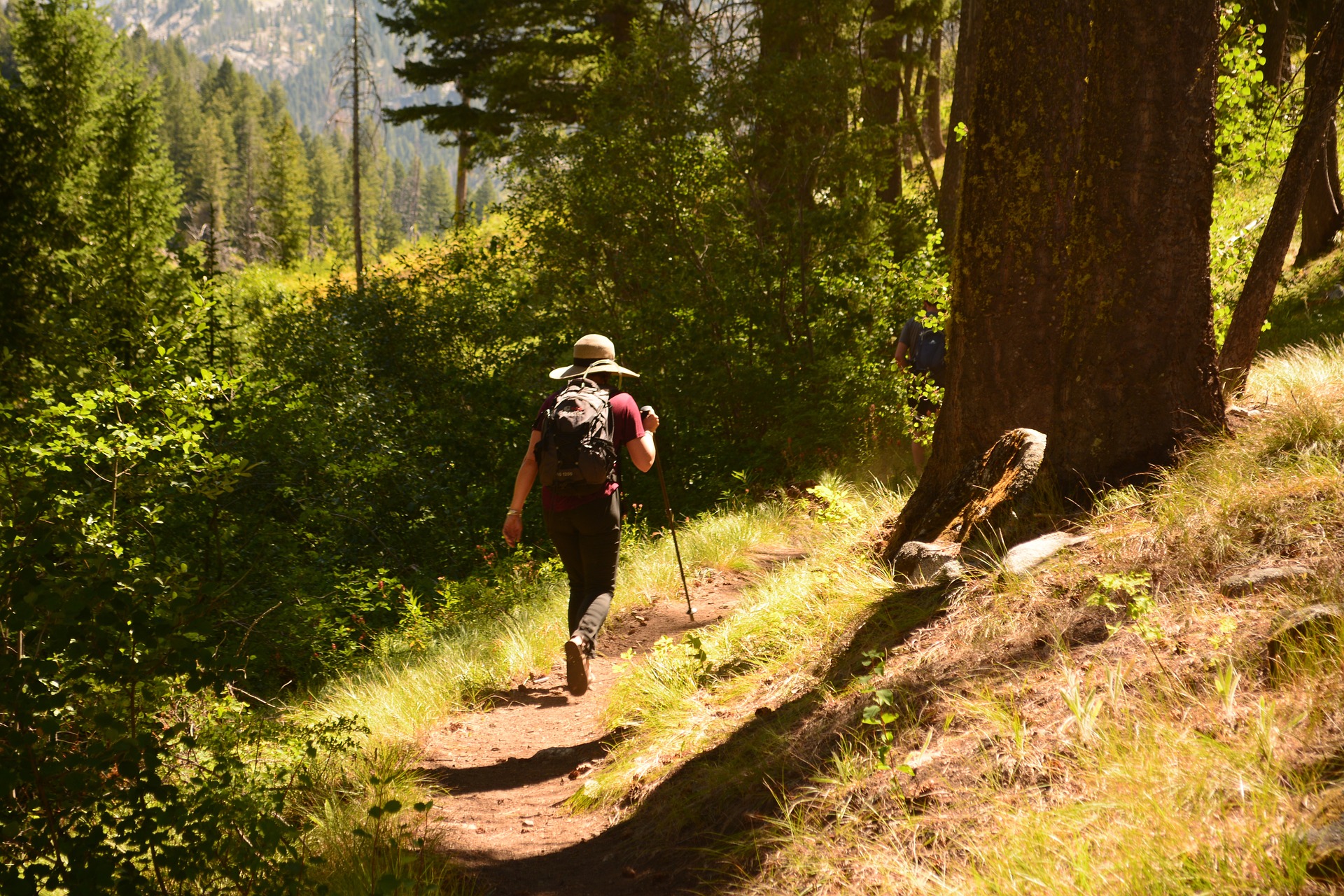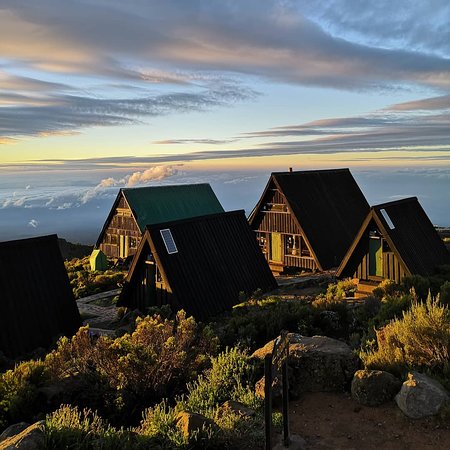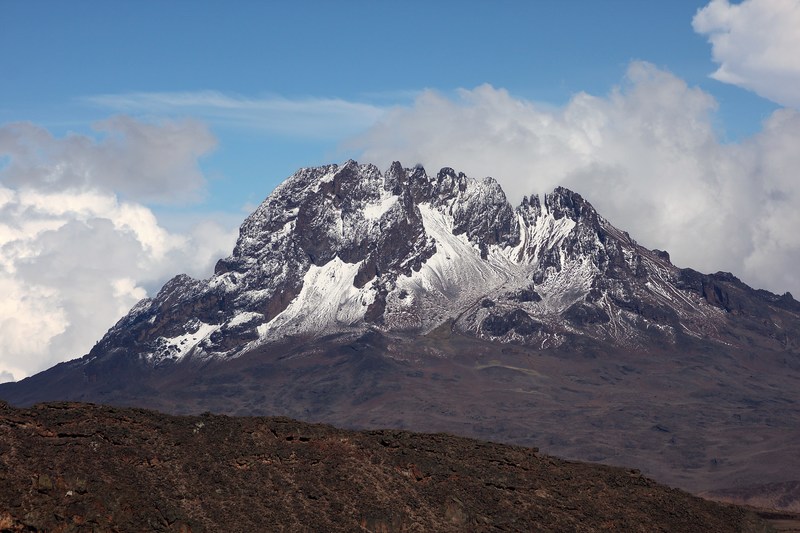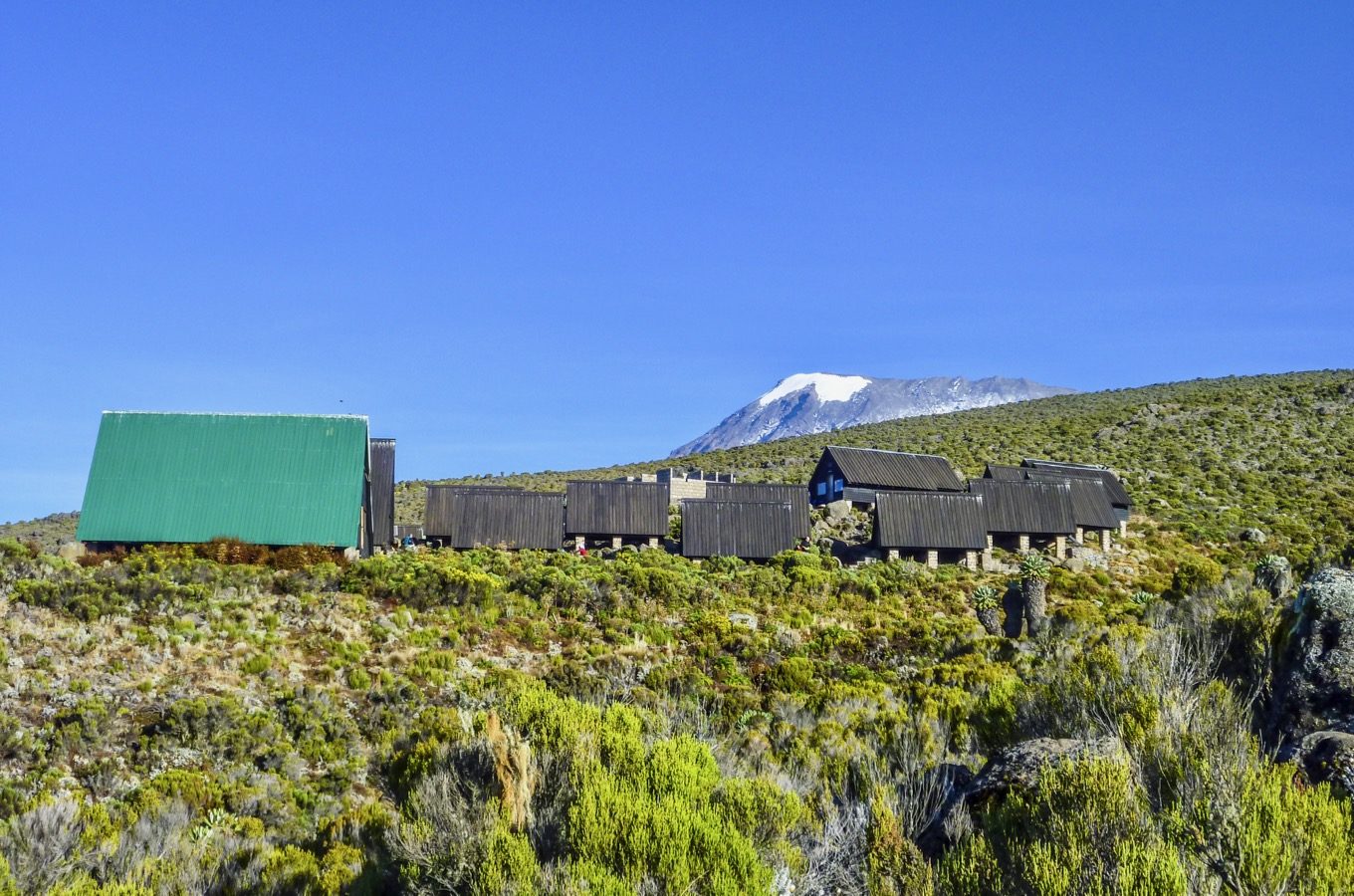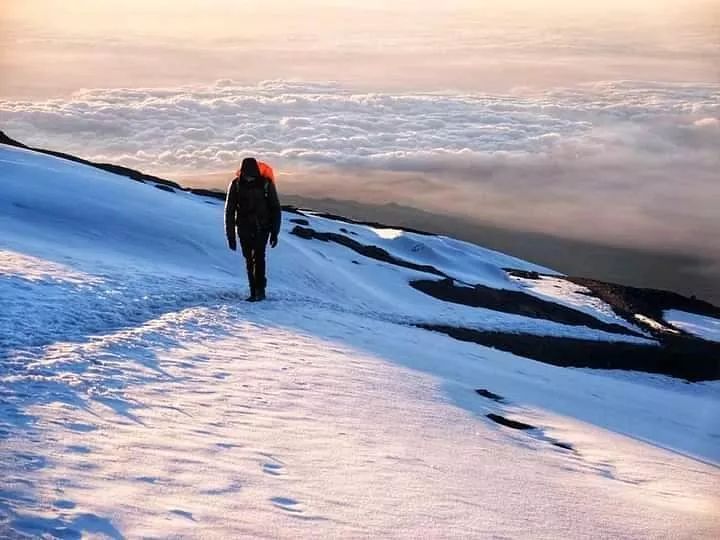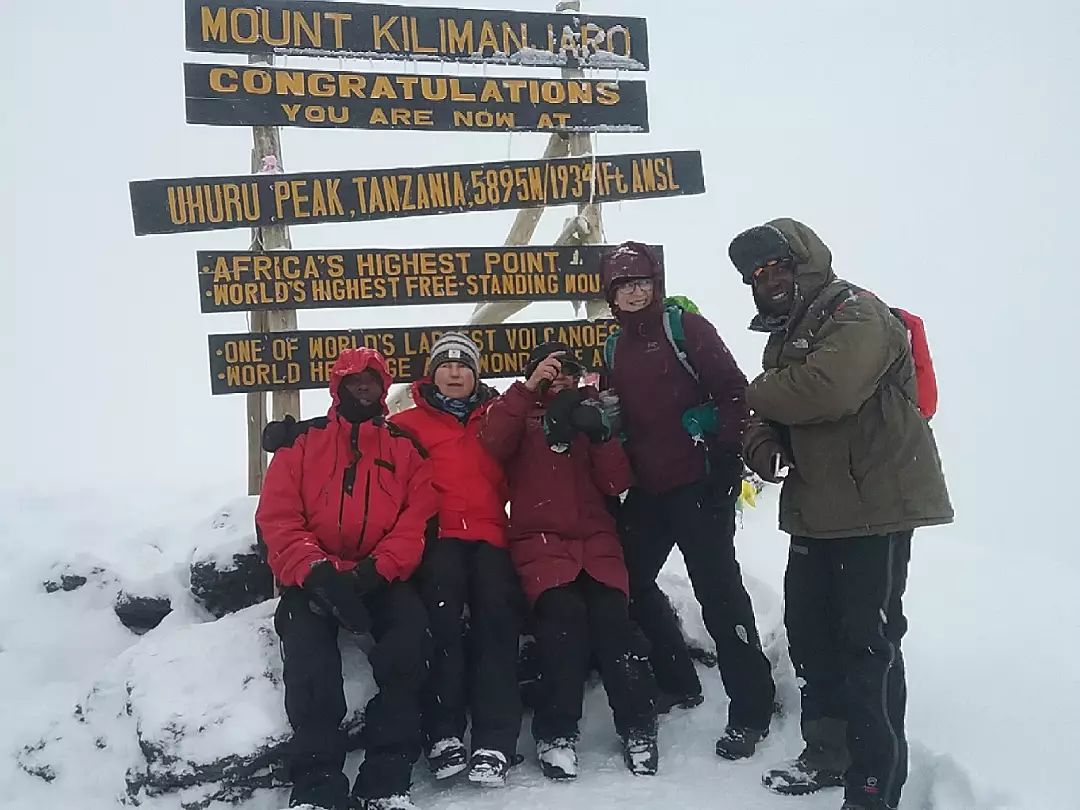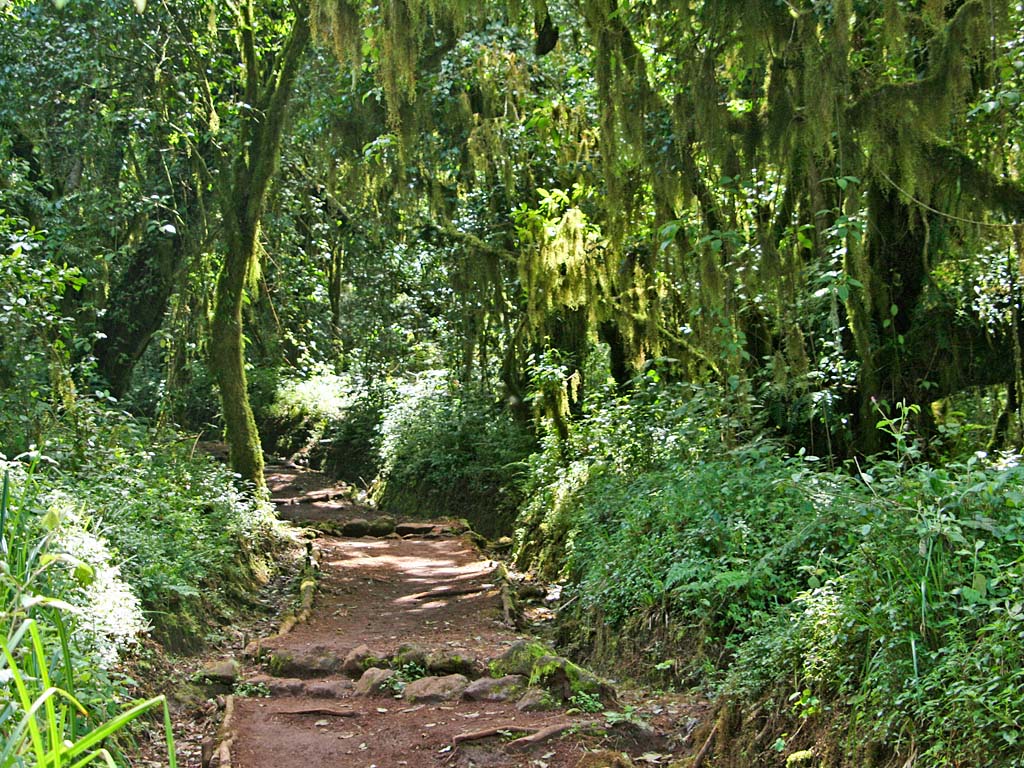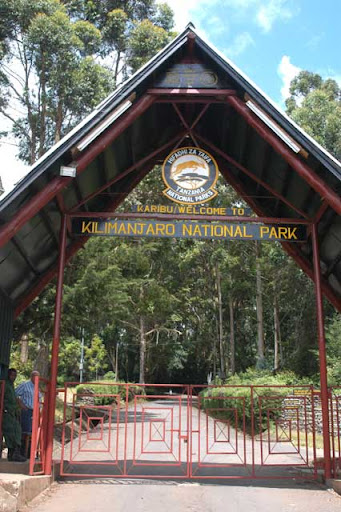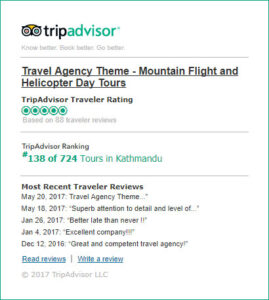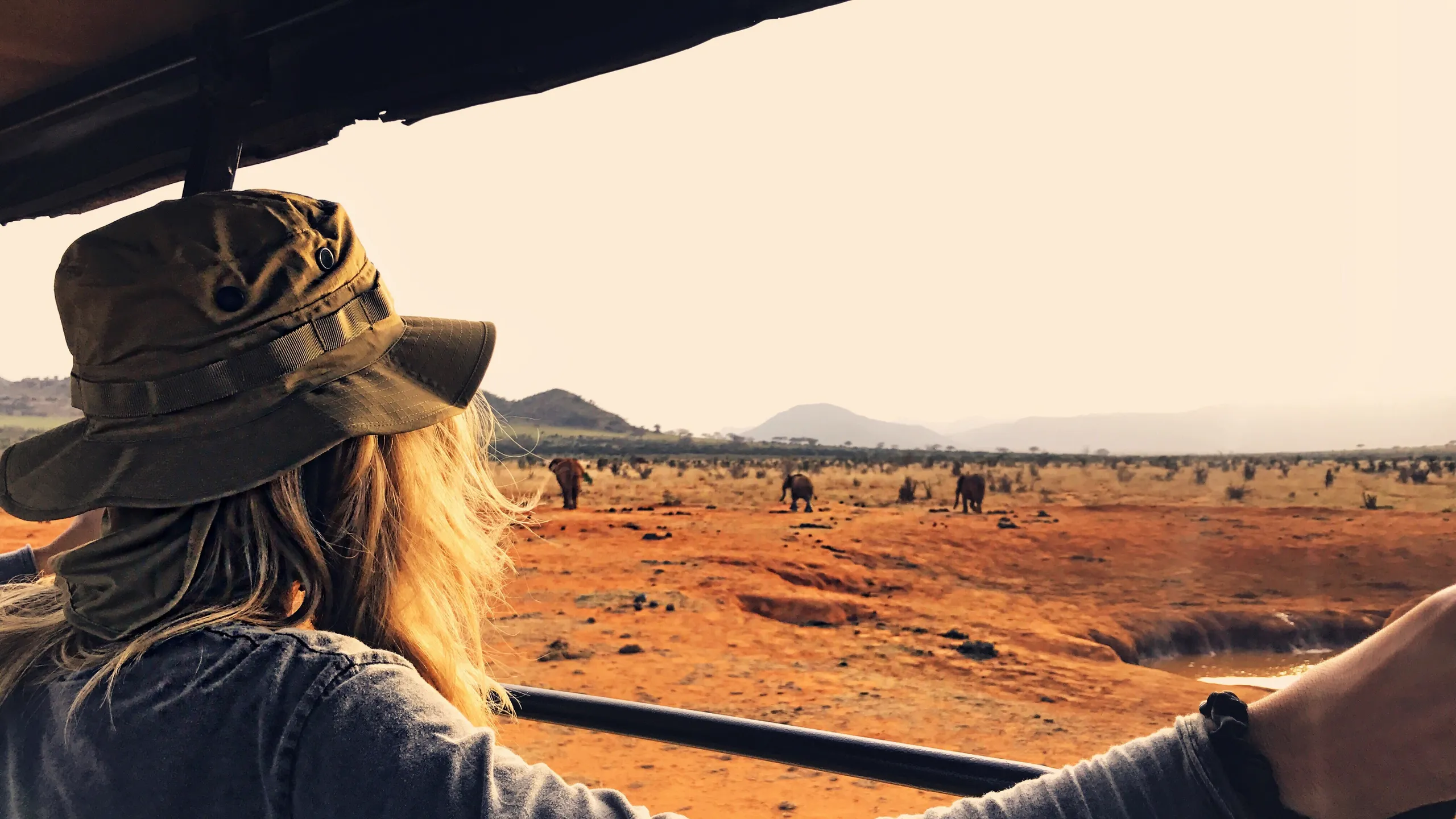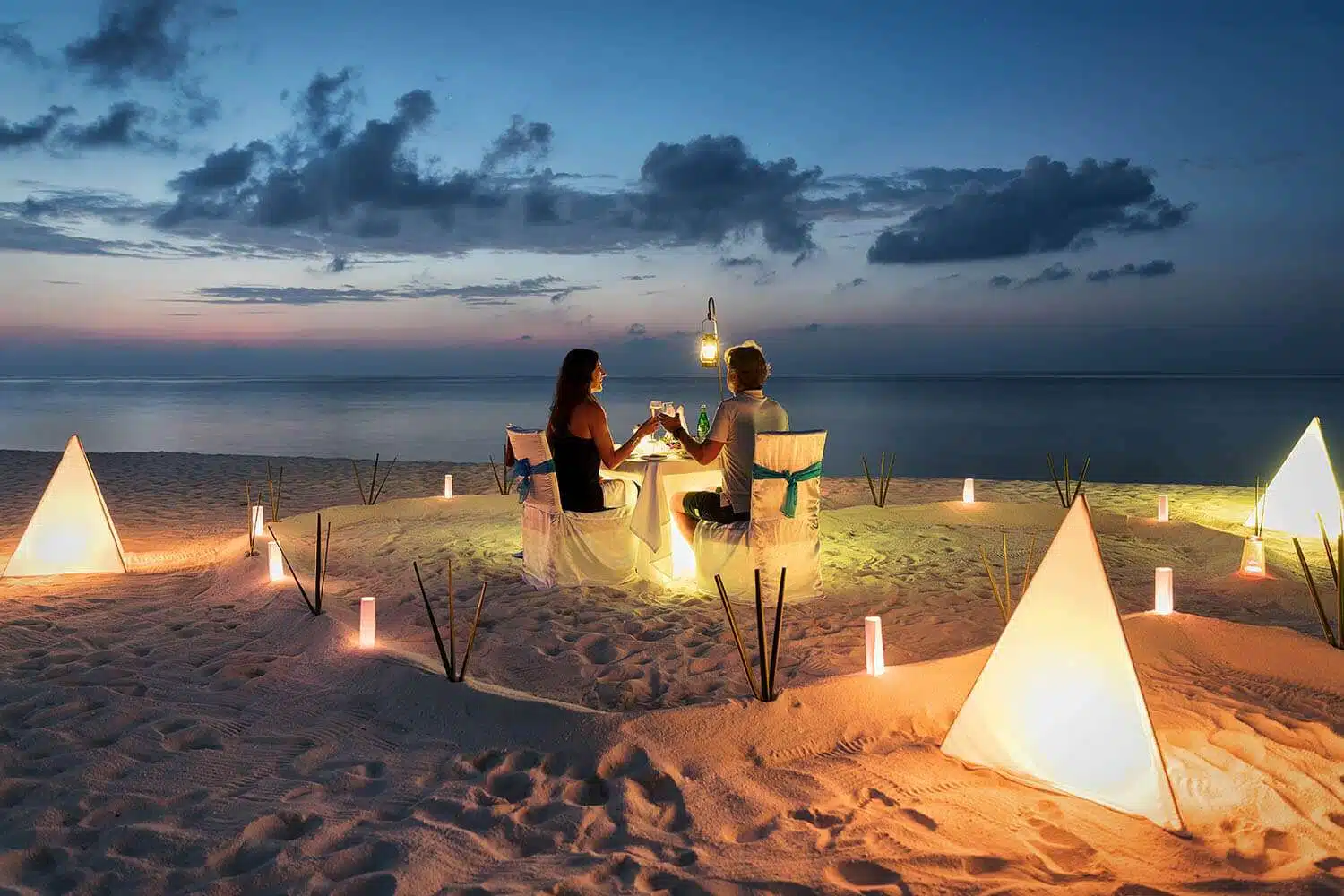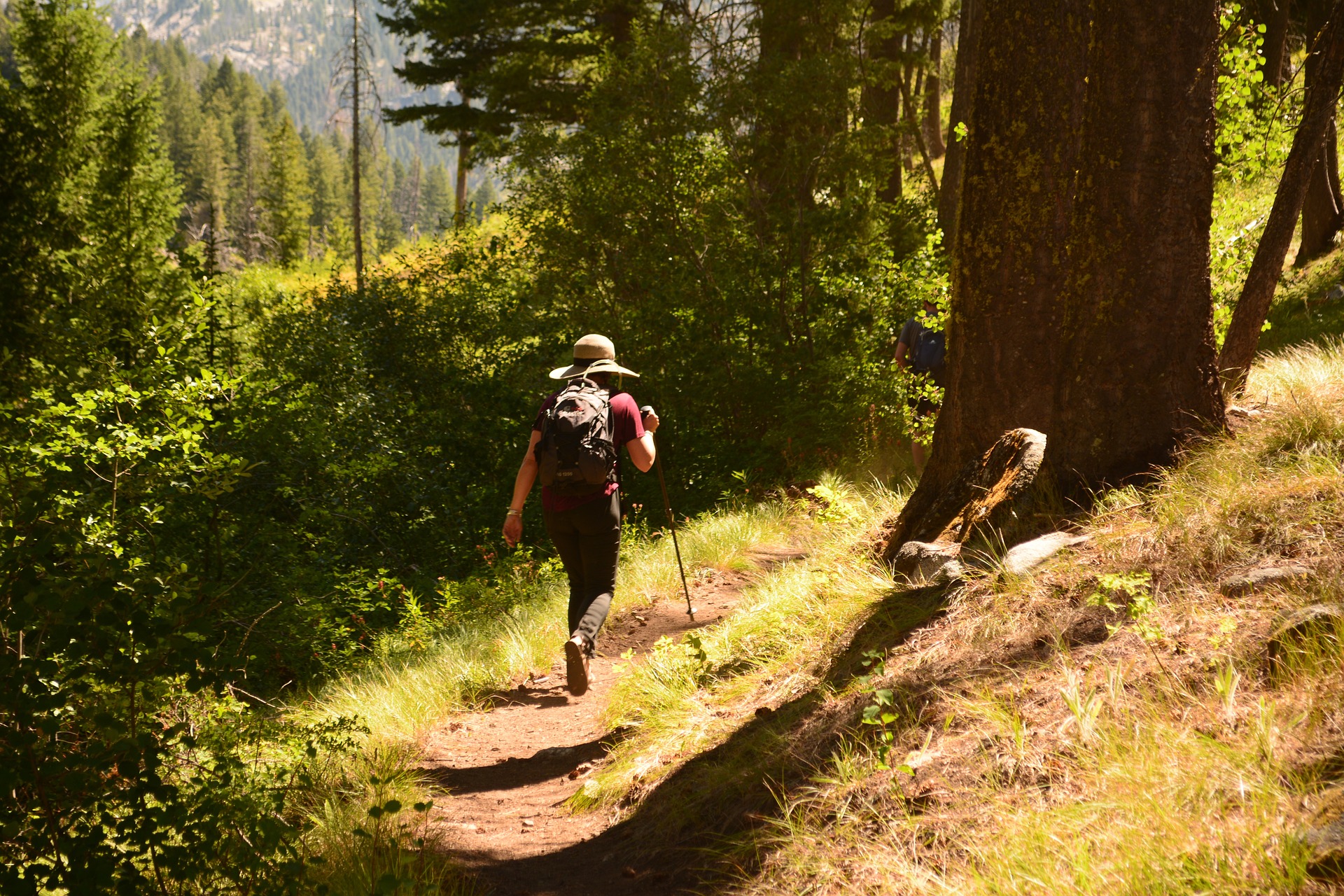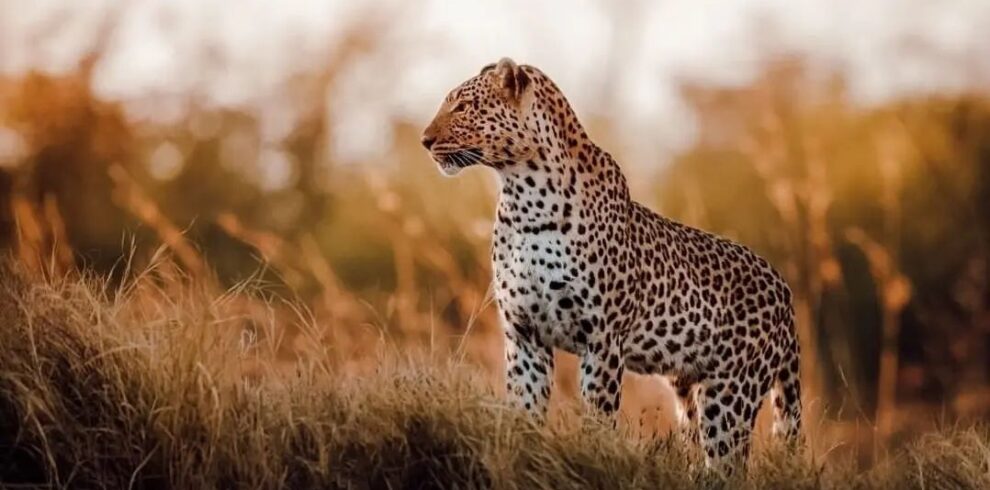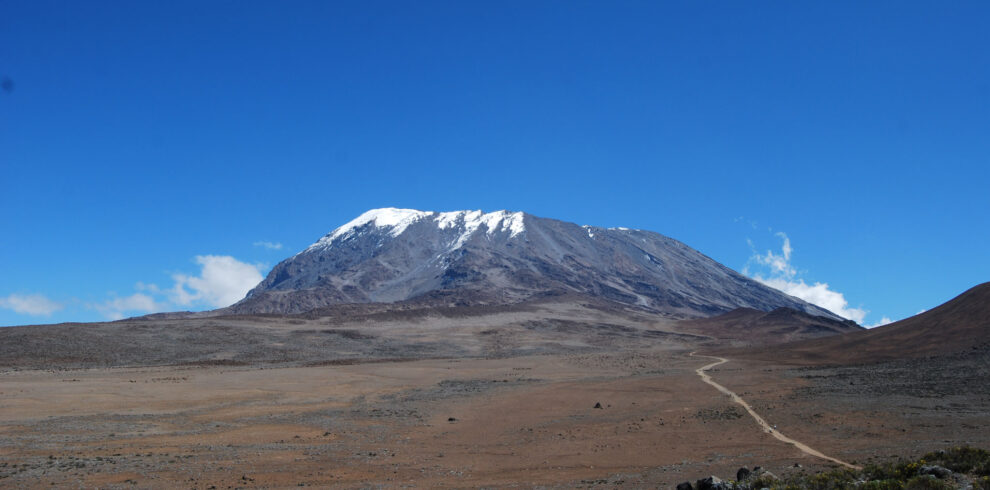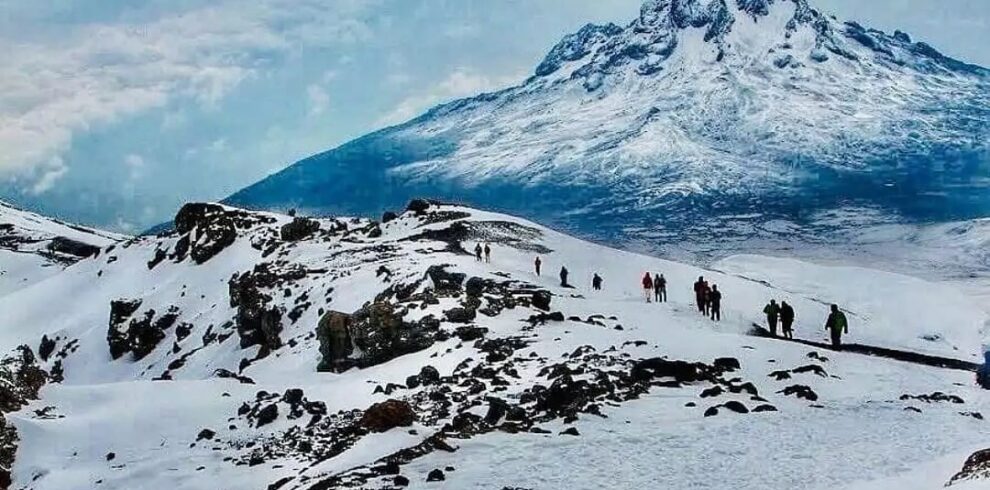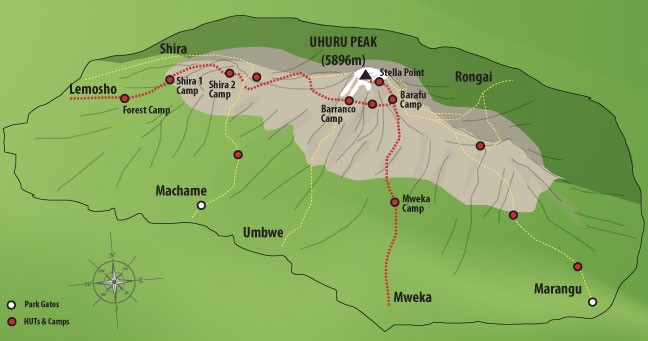The Marangu Route, also known as the “Coca-Cola route,” stands as the oldest path up Mount Kilimanjaro, tracing the footsteps of Hans Meyer’s historic 1889 summit. Situated within Kilimanjaro National Park, this route traverses all climatic zones, from lush tropical forest to barren alpine desert, offering a diverse trekking experience. Notably, it is the sole route providing dormitory-style huts for overnight accommodation.
Considering the Marangu Route for your Kilimanjaro climb? It’s an excellent choice during the rainy seasons, from mid-March to late May, and late October to late December, thanks to the huts ensuring dry and comfortable shelter. Available in 5- and 6-day variations, the latter is notably less strenuous.
While the Marangu route treats trekkers to picturesque vistas of Kilimanjaro’s southern slopes, its shared ascent and descent path contribute to crowded conditions and limited scenery variety. Although the allure of the 5-day itinerary may be tempting, its demanding acclimatization requirements pose challenges, making the 6-day variation or longer itineraries on alternative routes more suitable, especially for beginners.
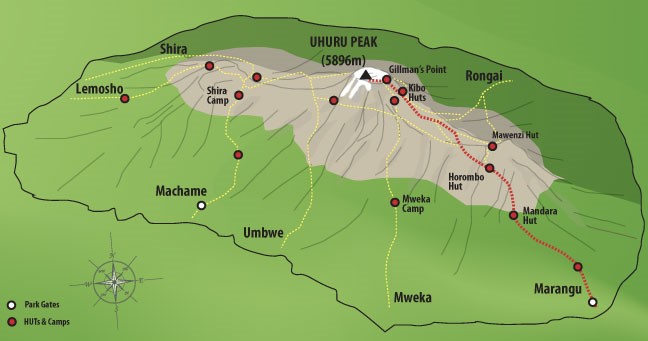

Marangu route
The Marangu route stands out as the oldest path up Mount Kilimanjaro. The 6-day variation is a moderately challenging hike, offering a unique experience as the only route where overnight camping in tents is not required. Instead, trekkers are accommodated in well-known mountain huts, a feature often highlighted in discussions about this route.
For private climbs, please fill out the enquiry form bellow.
Itinerary
Upon your arrival at Kilimanjaro International Airport (JRO), a representative from Serengeti Heroes Safaris will greet you and facilitate your transfer to the hotel included in your package. The hotel offers all the essentials for a comfortable stay, featuring cozy rooms, hot water, courteous staff, a refreshing swimming pool, and Internet access. An evening briefing with our managers will ensure you are well-prepared to commence your climb.
For private tour packages, shared airport transfers are included for your group. Additional charges may apply for individual transfers, so coordinating your group’s arrival and departure times can help avoid extra costs.
PLEASE NOTE: Check-in begins at 2:00 PM.
On Day 2, your guide and mountain support team will greet you at the hotel for a brief morning meeting. Following this, you’ll embark on a vehicle journey to the eastern entrance of Kilimanjaro National Park: Marangu Gate (1,860m/6102f). After obtaining climbing permits and registering with search and rescue services, your group will commence the trek to Mandara Hut (2,720 m /8,922 f). The trek passes through the rainforest, where tropical showers are common, so it’s advisable to bring spare clothes and raincoats. Upon reaching the camp, our mountain support crew will handle necessities and prepare lunch.
Throughout the Marangu route, accommodation is provided in special huts, offering a comfortable alternative to tent sleeping.
PLEASE NOTE: The acclimatization hike aids in the acclimatization process, significantly enhancing the chances of a successful Kilimanjaro ascent and mitigating altitude sickness risks.
As it’s your first day at this altitude, adhere to the following guidelines:
– Refrain from consuming alcohol and caffeine.
– Hydrate with over 4 liters of bottled water daily, sipped frequently.
– Consider using preventive measures like high-altitude aid medicine to alleviate symptoms of altitude sickness; consult your doctor beforehand for potential allergies or health concerns.
Nighttime may bring discomfort due to acclimatization to high altitude. Your body receives less oxygen during reduced nighttime breathing, potentially causing sickness or headaches. Be attentive to your body and inform your guide of any symptoms of altitude sickness.
After enjoying a hearty breakfast, the group will set out from Mandara Hut towards the second high-altitude camp: Horombo Hut (3,720 m /12,202 f). Upon reaching the camp, you’ll be rewarded with panoramic views of two volcanoes: Kibo and Mawenzi.
Following lunch, an acclimatization hike towards Kibo Hut will be undertaken, with a gain in altitude of 200 m /656 f. Afterward, you’ll descend back to Horombo Hut, where dinner will be awaiting your return.
Following breakfast, you’ll embark on an acclimatization hike to Kibo Hut and return to the camp.
Later, post-lunch, you can explore the nearby surroundings, capture stunning shots of Mawenzi Volcano, or simply relax before the next trek to Kibo Hut. To optimize your acclimatization process, we’ll spend the night at Horombo Hut camp, maintaining the same altitude.
After breakfast, the group will begin trekking to Kibo Hut (4,720 m / 15,482 ft). The trek itself isn’t overly challenging, but it’s important to maintain a steady pace to conserve energy for the summit climb. Upon reaching the camp, lunch will be served, followed by a recommendation to rest as much as possible, refrain from strenuous activity, and stay hydrated by drinking plenty of water.
At night, your group will embark from Kibo Hut (4,720 m /15,482 ft) for the trek to Kilimanjaro’s summit: Uhuru Peak (5,895 m /19,336 ft). While technically not challenging, this section of the Marangu Route presents difficulty due to the high altitude, making even routine physical exertion demanding.
During the final summit hike, climbers are paired with a guide for support, monitoring their physical condition, and providing encouragement for the ascent.
Upon successfully reaching Uhuru Peak, you have the option to descend to the nearest glacier before returning to Kibo Camp. After a two-hour rest, you will continue the descent to Horombo Hut (3,720 m /12,202 ft).
Kindly note:
It’s crucial to remain vigilant during the descent, as a majority of accidents, including toe injuries, occur during this phase.
In the morning, a warm breakfast awaits before we embark on our journey to Kilimanjaro National Park’s exit: Marangu Gate (1,970 m /6,462 f). Upon descent, the entire group will gather to celebrate your achievement, offering you the opportunity to share your thoughts and experiences in the guestbook. To commemorate your journey, you’ll receive a certificate before we arrange your transfer back to the hotel.
Relax at the hotel before transferring to the airport.
Kindly be advised that hotel check-out is scheduled for 11:00 AM. Should your flight depart in the evening and you require a late check-out, you have the option to extend your hotel stay for an additional fee.
Cost
Climbing Cost Includes
- All transfers Upon Arrival
- Hotel before and after the hike
- Camping equipment
- Meals during the Climb
- Professional guides and porters
- Oxygen tanks
- GPS Trackers
- All park fees and taxes
- Dedicated support team
- Safe room and storage room
- Environmentally friendly treks
- Medical check-ups
- Fully-loaded medical kits
- And in-company doctor
Climbing Cost Excludes
- International flights
- Visa fee
- Tips to the climbing crew
- Personal gear rentals
- Single supplement accommodations during the climb
- Travel insurance
- Portable toilet
- Lunch and dinner in the hotel
Marangu Route FAQ
The Marangu route itinerary on Mount Kilimanjaro is often referred to as the “Coca-Cola route” because it is perceived as one of the more “touristy” or “comfortable” routes to climb Kilimanjaro. However, while it may offer more basic amenities compared to other routes, the climb still presents significant challenges and requires adequate preparation and fitness. Climbers need to recognize that regardless of the route chosen, summiting Mount Kilimanjaro needs commitment and some preparation.
Additionally, if you wish to complement your Kilimanjaro climb with a Tanzanian safari or an island vacation, we are more than happy to accommodate your preferences.
Both Kilimanjaro Marangu route and Lemosho route are chosen by thousands of hikers every year. Marangu route’s hut accommodation might appeal to some, while Lemosho offers stunning views, an easier acclimatization profile, and higher success rates, especially on its 7 and 8-day variations. Marangu has another advantage that we can mention: there’s an emergency road to Horombo Hut, at an altitude of 3,720 meters (12,205 feet). This means that in the rare cases when an evacuation is needed, it would be possible to organize it faster on this route. However, every camp on Kilimanjaro has a helicopter pad for evacuation cases that require immediate helicopter rescue.
Both Machame and Marangu are frequently compared due to their popularity. The fact that Marangu is the only Kilimanjaro route with dormitory-style huts sets it apart. It is particularly suitable for climbing Kilimanjaro during the rainy season, alongside other northern Mount Kilimanjaro routes like Rongai 7. While both routes witness considerable foot traffic, Marangu’s uses the same trail for ascent and descent, which can result in a more congested experience. Additionally, this fact somewhat narrows the variety of landscapes you encounter on the Marangu trail. Hikers on both these itineraries have approximately 87% chance of reaching the highest summit of Mount Kilimanjaro. However, this rate is slightly lower compared to other extended itineraries that last 7 days or longer. This is primarily due to the more challenging acclimatization. If you’ve decided to choose between Machame 6 and Marangu 6, we would say that Marangu 6 might be a little easier.
Marangu 6 days is a moderately difficult route accessible for a variety of climbers. However, its 5-day variation is significantly more difficult and we do not recommend it to beginners. The most challenging part of climbing Mount Kilimanjaro is usually the summit day in the high-altitude desert. Longer itineraries provide an opportunity to achieve better acclimatization and make the summit day more manageable.
The Marangu Route is available in two variations or itineraries: 5 or 6 days. The 6-day variation is a moderately challenging hike, while the 5-day Marangu route is recommended only for experienced high-altitude or those with good prior acclimatization.
You will share a room with your travel companion during the trip, or, if traveling solo, with a same-sex traveler. Should you prefer a single room, please request a single supplement at your earliest convenience. Our hotels often reach full capacity, so securing your accommodation in advance is advised. Additionally, if you decide to descend earlier than planned, extra charges for any additional nights spent in our hotels will apply. Please contact your travel consultant to arrange a single room booking.
On the day preceding the climb, our managers will conduct an orientation briefing at your hotel, and our vehicle will pick you up to embark on your Kilimanjaro adventure.
During your adventure with Serengeti Heroes Tours & Safaris, our dedicated mountain chefs and waiters will ensure that you are well-fed with delicious and energy-rich meals. Our menu has been meticulously crafted with the expertise of a professional dietitian to provide hikers with the nutrition they need while delighting their taste buds.
Understanding that dietary preferences vary, we proudly offer a range of meal options, including vegetarian, vegan, gluten-free, and lactose-free dishes. Simply inform your manager of your dietary requirements, and our mountain chef will happily accommodate your needs at no extra cost.
For breakfast, anticipate a hearty spread featuring porridge, eggs, sausages, local-style spinach (“mchicha”), and freshly brewed coffee or tea. Lunches typically include a variety of soups, stews, salads, and main dishes, while dinners feature flavorful soups, salads, stews, and a selection of chicken, beef, or fish entrees. Fresh fruits like mangoes, oranges, pineapple, and bananas are served after each meal to boost your vitamin intake.
We prioritize sourcing organic, locally grown produce and meat from nearby farms with certifications from the Tanzania Food and Drugs Authority (TFDA). By supporting small local farms, we ensure that our ingredients are always fresh, organic, and contribute positively to the local economy.
During the expedition, our mountain chefs handle all meal preparations except for lunch on the first day, which is provided by our restaurant chefs from the Hotel. This meal is packed in sturdy compostable packaging from an eco-friendly food packaging supplier.
While our chefs strive to maintain quality standards in challenging conditions, please understand that factors like inclement weather and camping constraints may occasionally affect the appearance and presentation of our dishes. Nevertheless, our team remains committed to delivering exceptional dining experiences amidst the demanding environment of Kilimanjaro.
During your journey with Serengeti Heroes Tours & Safaris, you’ll be guided by our exceptional team of Kilimanjaro mountain guides.
Extensive Experience:
Our guides boast a minimum of seven years of experience and possess in-depth knowledge of Mt. Kilimanjaro’s terrain, flora, and fauna.
Certified Wilderness First Responders:
Rest assured, all our mountain guides are certified Wilderness First Responders through Wilderness Medical Associates, an esteemed USA-based organization. This certification ensures they are well-equipped to handle any emergencies that may arise in the wilderness, providing you with peace of mind throughout your journey.
Compelling Storytellers:
Our guides are skilled storytellers, ready to captivate you with Kilimanjaro legends and tales while imparting knowledge about the mountain’s ecosystem and history. For those interested, they can also share insights into local culture, lifestyle, and customs. However, they understand the importance of solitude and will respectfully give you space to immerse yourself in nature when desired.
Dedicated Support Team:
Supported by a diligent team of porters, camp managers, and crew members, our guides ensure that every aspect of your expedition runs smoothly. From setting up camp to fetching water from mountain streams and transporting supplies, our support team works tirelessly to enhance your experience.
When embarking on your Mount Kilimanjaro adventure, essential personal gear such as hiking boots, sleeping bags, trekking pants, thermals, and trekking poles are necessary. For a comprehensive list, please refer to our equipment checklist.
At Serengeti Heroes Tours & Safaris, our gear rental shop stands as the premier choice on Kilimanjaro, offering climbers access to all the necessary equipment for their journey. Our gear selection comprises top brands like The North Face, Black Diamond, RedFox, Columbia, Marmot, Mountain Hardwear, and more.
To streamline your rental process, simply provide us with a list of the gear you require in advance. Rest assured, we’ll have everything prepared for you prior to your arrival in Tanzania, ensuring a hassle-free experience.
Map
